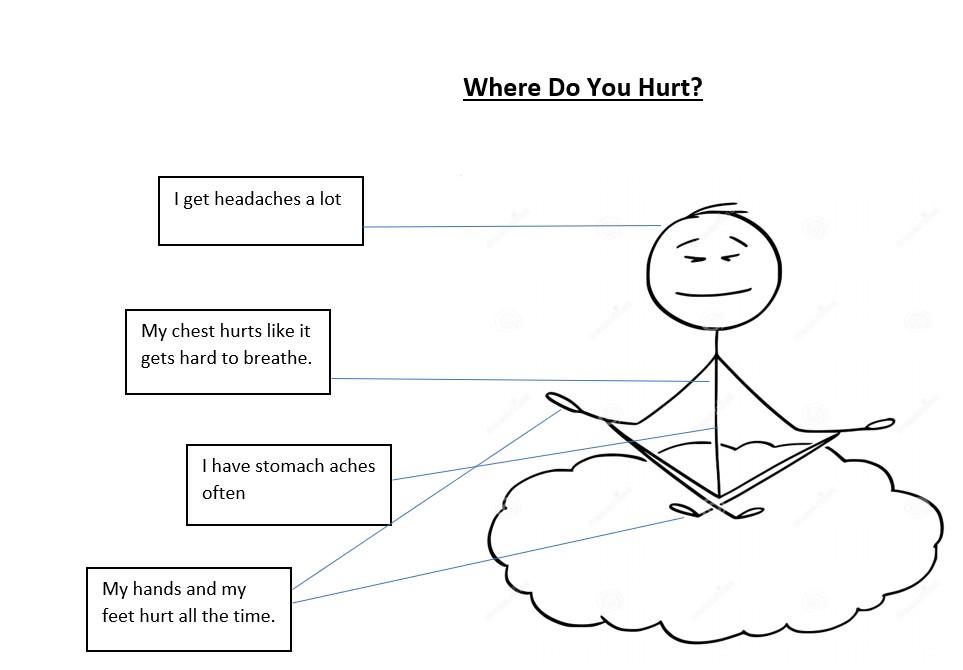
8 minute read
What is Yoga and How Can Yoga Elevate Self Esteem
What is Yoga and How Can Yoga Elevate Self Esteem Tierney Langdon tierney.langdon@gcpsk12.org
Yoga. It seems like a new buzz word. Doctors often tell people who need to exercise and lower stress to “try yoga.” Soo…what is yoga really?Well, I would like to start off with what yoga is NOT! It is NOT a religion. It is NOT a culture. It is not a Way of Life. The Collins English Dictionary ( https://www.collinsdictionary.com/dictionary/english/yoga) Defines yoga in this way: “Yoga is a type of exercise in which you move your body into various positions in order to become more fit or flexible, to improve your breathing, and to relax your mind.”
Advertisement
In Hindi the word “yoga” means to join or unite. Through the practice of yoga one begins to join or unite their breath to their movement. This is why it’s called yoga. I like to consider yoga as a more in depth understanding of stretching and the natural benefits that come from taking care of your body, mind and soul.
Child Light Education Company offers training for certification in a class called “Yoga and Mindfulness for Teens and Tweens.” I personally have benefitted from this certification. I have been able to use my own philosophy related to yoga and mindfulness to be able to share it with students in a way that will positively influence and enrich their academic experience.
According to Karen L. Michaud-Holland RYT, “Yoga offers tools to empower you, and cultivate positive relationships that invoke a sense of trust and safety for your students, and to allow them to be who they are without judgement.” This is a process and the sense of trust and safety is established through the progress of each student. In a middle school setting, I created a stress management club, where students are able to attend as needed to learn tools to handle stress, anxiety, and life.

Stress management club meets once a week after school from 4:30 to 5:30. During this time students learn strategies and tools for body awareness and mindfulness. Students begin the club feeling a bit awkward with the breath and quiet meditations. After the first meeting, the students who attended became excited for more stress management techniques. Of the students in the group, data shows that more than half of the students improved in their classwork performance. Teachers also started to notice the students in the stress management class willing to participate more in class and encourage others to participate as well. I enjoyed watching the students' confidence grow throughout the school year, with the help of the stress management club.
I look forward to continuing to offer a stress management club at my school. I see the benefits that mindfulness and yoga have had on our tweens and teens. I see it as an opportunity to create foundational skills for the students that will lead to a healthy mindset and positive decision making skills. Students begin to have a tool box of strategies that they can carry with them throughout the day. This not only improves their confidence but gives them a life long benefit to handle stress.

Ricardo Lyons-Alvarez, ricardo.e.lyons@gmail.com
It’s no secret that school counselors are advocates for the students that we serve. However, in some cases, counselors get pulled in many different directions and lose time to non-counseling duties such as lunch duty, substitute, 504/RTI/MTSS coordinator, etc. While there are some fair-share duties that school staff must all assist with, school counselors may end up with a list of duties and responsibilities that take away from the main objective: serving the students in the school. Because of this, school counselors must advocate for their school counseling program. When people think of advocacy, they may think from a legislative standpoint, but this article will provide different ways school counselors can promote their programs at a local level. School counselors can directly engage staff while advocating for their program. Here are the steps that will be outlined in the article: Developing relationships, providing examples of how counselors can help achieve goals, being visible in the schools, and using data to promote your program are just a few of the ways counselors can engage others while empowering themselves.
Building Relationships Through Engagement.Whether it is a brand new school counselor or a veteran with years of experience, developing relationships with teachers and administrators can be a huge step in promoting a school counseling program. Learning about the staff and letting the staff get to know you can help lower defenses and can help foster positive working collaboration, just as it would with students and parents. It is also a great time to learn about the goals of the teachers or administrators for the year and can help counselors align their goals. A positive relationship would also allow school counselors to get a better understanding of the teacher and their environment and create alliances with other members of the school community, giving school counselors more opportunities to promote the school counseling program!
I Can Help! Here’s How!
Once those relationships have been established with the staff, school counselors can show how their programs benefit the teachers. When teachers and administrators see that counselors share their interests, they may be more enthusiastic about the program. An example: an elementary school counselor and one of the homeroom teachers talk about their goal to increase The Georgia Milestones Assessment System (GMAS) scores for their 3rd grade homeroom this year, but it has been frustrating because there have been constant interruptions in class (students distracted, arguing with one another, etc.) The counselor can advocate for helping the students while aligning with the teacher ’s goals.
The school counselor may suggest classroom lessons on study skills and resolving conflicts, small group sessions on social skills and selfcontrol, hosting parent nights inperson or virtually on the importance of GMAS, and tips for the night and days before GMAS, etc. The school counselor has shown how they can help the homeroom teacher with their yearly goal through the school counseling program while advocating for their program.
Example 2: the assistant principal approaches the school counselor in the morning, stating a teacher is out and they need the counselor to watch the class as they do not have a substitute available. The counselor has built a positive relationship with their administrator and wants to help but is not a substitute teacher and has a small group in the morning.
The counselor states they have a group session in the morning and asks the administrator to find someone to cover in the beginning. Once the group is over, the counselor offers to come and do a lesson to cover some more of the day while the admin works on finding a sub. The counselor then goes in and does an impromptu lesson based on the needs of that class. The counselor also uses some time to build stronger relationships with the class and could even do an emotional check-in with all of the students to address any individual or classroom needs.
Are counselors substitute teachers? No. Are counselors still asked to cover classes and expected to do so? Yes. Of course, counselors want to stay as close as possible to the 80% to 20% ratio when it comes to their use of time. However, approaching this with the "counselors don’t do that" idea may do more harm than good. Instead of pushing back with what counselors don’t do, school counselors can showcase what they can do and how they can help in an instant.

The more a counselor is seen, the better stakeholders understand what they do, and this works with staff as well. The more the school staff sees what a counselor does, the better they can understand the role. Of course, this is not guaranteed, but it can help. There has been a negative perception of counselors in the past; they sit around and talk about feelings; they are in their office doing nothing; teachers don’t see them, so they don’t understand what they do. The truth for counselors is that teachers may not see them as much because of the many hats counselors wear, including non-counseling duties like RTI and 504 coordinators, testing coordinator, and substitute, to name a few. So how can a counselor engage staff and be more visible?
Be visible - School counselors can physically engage staff and showcase their program in a myriad of ways. Some examples can include classroom check-ins, staff check-ins, guests at Professional Learning Community meetings (PLCs), collaborative meetings with teachers and/or admin, as an advocate for students at conferences or annual meetings, and presentations at staff meetings. This does not even include when they see counselors respond to individual, group, or school-wide crises. Being digitally visible gives staff a better understanding of the counseling program at the school. Virtual meetings, electronic check-ins through tools like Google or Microsoft Forms, virtual training and parent nights, emails centered on the social and emotional well-being of students and staff, and providing a wealth of resources through emails, social media, and a school counseling website can help staff and other stakeholders interact with the school counseling team and gain allyship.
Data Will Astound Them. Data can answer a lot of questions staff may have when it comes to the school counseling program. Counselors can use their data to address concerns or to advocate for themselves. Let’s say a teacher is pushing back on a counselor pulling a student because they are struggling in class. The counselor already has parental approval to pull the student out, but the teacher is resistant. "I understand that Ricardo needs to be in class and is struggling academically, but you mentioned he struggles to stay at his desk. I have been doing a self-control group, and in the past, teachers have seen a strong decrease in impulsive behaviors and an increase in their grades.
Final Words
School counselors can find ways to engage staff in their schools and districts while also empowering themselves and advocating for their school counseling program. Through relationship building, defining the school counselor's role, being visible to students and staff, and collecting and sharing data, school counselors can collaborate with staff, gain allies to help promote the school counseling program, and create a stronger, more comprehensive plan at a local level.






